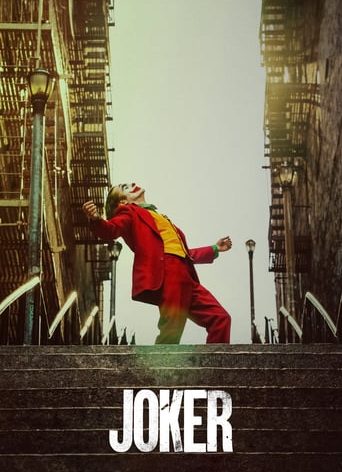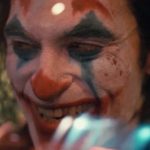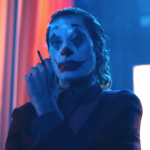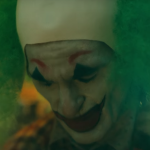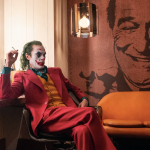Joker, 2019
Joker
Put on a happy face
Images

And I wish I was special
You’re so fuckin’ special
But I’m a creep, I’m a weirdo.
What the hell am I doing here?
I don’t belong here. – Creep; Radiohead
It’s the heart’s filthy lesson
What a fantastic death abyss – The Heart’s Filthy Lesson; David Bowie
Of putting off cigarettes on the wall and slipping a pair of scissors in the back pocket before answering the door.
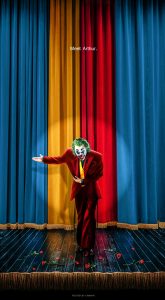
Why are we this full of praise for the character of Joaquin Phoenix‘s Joker? Is it the conditioning? The lessons learned in life? To react in a certain manner to tragedy, which is another man’s entertainment? Well, for one, this just stepped out of the boundaries of conventional entertainment; further, we are compelled to watch a man deconstruct and then rise as he literally descends in to a full blown, terribly painful – so much so that he is shown choking after every outburst – onset of psychosis/madness.
“What a fantastic death abyss”; once sang Bowie, asking Paddy, who was wearing Miranda’s clothes?

What is madness? Laughing uncontrollably, despite of oneself, they call it the Pseudobulbar affect? Phoenix showcases to us four different types of laughs, from the joyful to the psychotic and even when hurting and his insides being gnawed at, he laughs, unable to contain or being hegemonic to his demons, of which there are plenty. Does being this dark mean that the film is automatically more profound and meaningful?
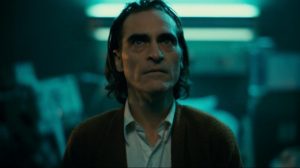
Where Ledger snarled and changed the way he spoke every time (“you remind me of my father and I hated him“), for every situation, Phoenix is rather soft spoken and that makes him even more villainous and his Joker even more bloodcurdling, his tragic past notwithstanding, for that is now overcome with the violence he dishes out. Violence that he is seemingly incapable of but here it is; first in the subway with the drunk Wall Street bullies in suits and then going all Christine Chubbuck (hosting the morning show at TV-40 on July 15, 1974, where she shot herself after covering three news stories; before which she had joked with the producer of bringing a .38-caliber Smith & Wesson Model 36 to the show and killing herself, much like how Arthur does during the interrogation scenes; saying that “it was only a prop” and also while day-dreaming of being on Murray‘s show) during a talk show, which I believe is the most shocking moment in recent movie history.
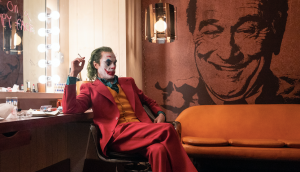
Plus, it is all inverted here. When life is dealing him one bad hand after another, he is shown climbing the Odessa-type stairs of the Battleship Potemkin (1925) fame, from the pharmacy, hunched and his body language desolate and hopeless. Just like how Pier Paolo Pasolini showed to us in his last film, Salò, or the 120 Days of Sodom, 1975. The prostitutes climb down to their celebrated and illustrious positions of story tellers and the boys and girls are gagged and bound and stripped and are shown being pulled by leashes up the stairs to a room where they are subjected to even more torture. Director Todd Phillips may have subconsciously followed a pattern here but it works like clock-work and to much dismay of the audience, which is getting even more uncomfortable at each act of transformation, from the scene in the bus where he tries to amuse a young boy to the slithery and menacing and spine chilling movement, an almost ritual dance in an abandoned bathroom to low and ominous notes being sliced on the cello and what is to become a ceremonial custom – after a certain something has happened.

Is this Scorsese‘s King of Comedy, 1980 minus the black comedy and filled with just comedy of the gods, with bleak sense of humor? There is no entertainment value being offered by Joker, oh no, it is just a brutal and solemn, even a compelling study in deconstruction of a man who is already asking himself from the start, whether it is getting crazier “out there, or is it just him?” This is a question that does not warrant an answer right away, instead we get to see the answer being played throughout the entire length of the film.
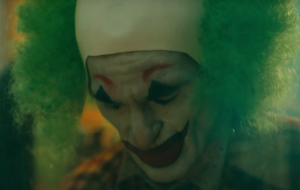
The wallpaper becomes all green and the hue also turns to viridescent, slowly, it is becoming or unbecoming since the film started and now, after Arthur Fleck has fully embraced the pandemonium that is his life, the eau de Nil is now officially the base-color of this film; when he is shown dyeing his longish hair after which he interacts with his ex co-workers in his own apartment, as he puts the cigarette out on the wall, with the cherry dissolving and the cigarette reducing to orange fragments coming off the wall as if in celebration; as if a tiny firecracker just went out, or a fuse in Fleck’s head, which is again covered with a green (with flowers) wallpaper. What happens after that, after he extends his arms as if pushing the walls apart and looks at the co-worker by slightly raising his all white head, is a true hand to heart transformation of a once acquiescent and a meek person to a soft speaking, self-assured and a scheming clown, dressed in a red suit with an orange vest and brown, two-tone shoes and green hair.
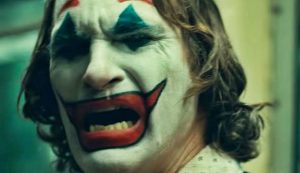
It is all very harrowing and distressing to watch, but, again; is it because we are conditioned to react a certain way to situations; our emotions reacting to the state of mind of a man on the brink of madness the way they do? Phoenix and Phillips change how we are supposed to feel, to react to tragedy or a triumph, a victory when insanity has fully taken over. First it confuses the keen viewer and just when we are getting acquainted with the drop, or think that we are in control of our emotions, they go ahead and turn everything upside down or the other way around and “Here… We… Go…” again, unsure of ourselves, becoming weary of what we were just shown or what Phoenix just did or how Phillips set his shot and how often we get to watch the joker from an angled perspective, convoluted shot of the man and his madness; from below him, his chin becoming most prominent and the cigarette never leaves the frame.

This is the antithesis of becoming something or someone. When he takes a seat at the talk show, and before that while waiting in the dressing room, the dark has fully engulfed a man who longed to be right here and when he gets there, he is not the same man; everything had to change just for him to be where he always wanted to be, he doesn’t smoke the same way, he is self assured, yet clumsy with a pistol, faltering – much like Jack Nicholson and his gauche antics – when the gun goes off in the living room (reminded me of a shirtless Travis Bickle speaking into a mirror) or when he starts to leave the show after all hell has broken loose) even when he has (or circumstances have) undone the man who was once Arthur Fleck who took care of his ailing mother.
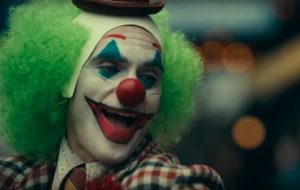
A darkly shot shows Fleck’s back as he grinds to music that only he can hear, or discern from the noise that fills his demented brain. The body movement or the dance of the mad man is enchanting, almost hauntingly alluring, it even grabs the attention of the backstage technical crew.
The curtains come apart and the larvae produces a butterfly (here the keen viewer is reminded of Kafka‘s The Metamorphosis (pub: 1915), with all the Seventies’ glamour intact, but we know through his Brando-type of reaction (alienating the audience even more within and outside the film) to the questions being thrown at him by Murray (Robert De Niro) and the notebook, which he carries with him and also takes note of new jokes: “Knock Knock. Who’s there. The police, ma’am, your son was just killed by a drunk driver.”
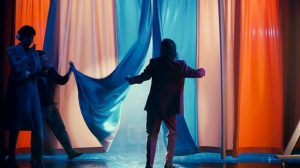
Goodness, is there any (even a tiny bit of) good sense left in the character of Fleck? Is there a method to the madness? I think not. Phoenix is completely and dangerously unhinged where Ledger was grounded and eventually no more (he stood firm and hence broke), Fleck is completely off the rocker (and keeps moving back and forth in a rhythm of disarray), deranged and we can still sense it in the promotional interviews for the film, even in front of the likes of Jimmy Kimmel and Fallon and what have you. We can see that something’s amiss; Phoenix is not the same anymore, not after that ritualistic dance in the abandoned public bathroom, not after running off with his mother’s thirty year old records from the Arkham Asylum, where he is shown after being institutionalized in the end, apparently locked up and speaking to a psychiatrist.
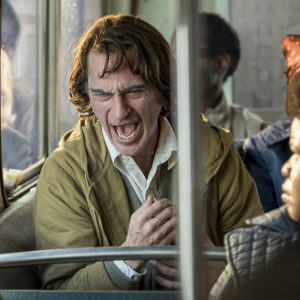
Doctor: “What happened?” After watching Fleck suddenly burst into laughter with a cigarette in his hand.
Fleck: “I thought of a joke” and the film cuts to the infamous alley, to the left of the theater playing Chaplin’s Modern Times, 1936 (I could be mistaken and the Chaplin masterpiece could’ve been playing at the City Hall) and then Zorro, The Gay Blade, 1981 or The Mark of Zorro, 1940 and thinking of a young Bruce Wayne sitting between his dead parents and shedding tears of pristine sorrow.
Doctor: “Would you mind telling?”
Fleck: “You wouldn’t get it!”
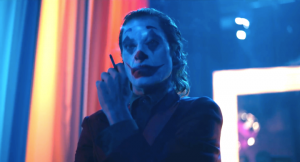
That’s it right there, we won’t get it, we just won’t and I seriously hope we don’t, for you see; if we do, we are already on our way up, climbing up to reduce, or taking a plunge to rise and eventually to become, just not how we would imagine becoming. Just like how he tries a hand (or two) with a young Bruce Wayne through the iron bars of a gate, exactly like how he had stretched his mouth in the beginning, pulling his fingers away and his mouth snapping shut in a grimace.
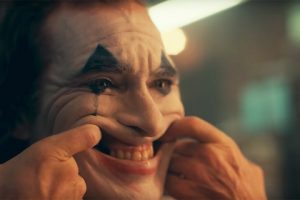
It all comes full circle to a ragged, torn almost-victory of Arthur Fleck.
Epilogue: The Killing Joke (pub: 1988)” is one of the most celebrated and highly acclaimed DC publications by Allan Moore, has the Joker say that his past is multiple choice; so could it all be just a raving fantasy of a man at The Elizabeth Arkham? And Todd Phillips has gone on record and said that the graphic novel has been taken from and is a principle source material for the film (along with “Joker” by Brian Azzarello, pub:2008); and that the audience is as involved as the rest of the crew, basically it’s a two way street and the way I see it, both ways lead to a dead end.
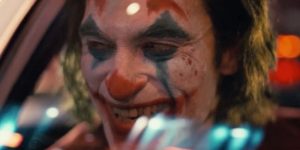
I’m so sick and tired
Trying to turn the tide, yeah
So I’ll say my goodbye
Laugh, laugh, I nearly died – Laugh I nearly Died; The Rolling Stones

